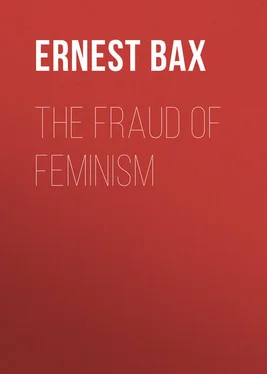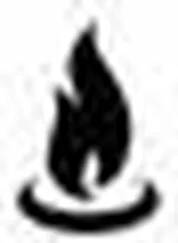Ernest Bax - The Fraud of Feminism
Здесь есть возможность читать онлайн «Ernest Bax - The Fraud of Feminism» — ознакомительный отрывок электронной книги совершенно бесплатно, а после прочтения отрывка купить полную версию. В некоторых случаях можно слушать аудио, скачать через торрент в формате fb2 и присутствует краткое содержание. Жанр: foreign_antique, foreign_prose, на английском языке. Описание произведения, (предисловие) а так же отзывы посетителей доступны на портале библиотеки ЛибКат.
- Название:The Fraud of Feminism
- Автор:
- Жанр:
- Год:неизвестен
- ISBN:нет данных
- Рейтинг книги:3 / 5. Голосов: 1
-
Избранное:Добавить в избранное
- Отзывы:
-
Ваша оценка:
- 60
- 1
- 2
- 3
- 4
- 5
The Fraud of Feminism: краткое содержание, описание и аннотация
Предлагаем к чтению аннотацию, описание, краткое содержание или предисловие (зависит от того, что написал сам автор книги «The Fraud of Feminism»). Если вы не нашли необходимую информацию о книге — напишите в комментариях, мы постараемся отыскать её.
The Fraud of Feminism — читать онлайн ознакомительный отрывок
Ниже представлен текст книги, разбитый по страницам. Система сохранения места последней прочитанной страницы, позволяет с удобством читать онлайн бесплатно книгу «The Fraud of Feminism», без необходимости каждый раз заново искать на чём Вы остановились. Поставьте закладку, и сможете в любой момент перейти на страницу, на которой закончили чтение.
Интервал:
Закладка:
Dr Thomas Buzzard, above mentioned, thus summarises the mental symptoms: “The intelligence may be apparently of good quality, the patient evincing sometimes remarkable quickness of apprehension; but carefully tested it is found to be wanting in the essentials of the highest class of mental power. The memory may be good, but the judgment is weak and the ability to concentrate the attention for any length of time upon a subject is absent. So also regard for accuracy, and the energy necessary to ensure it in any work that is undertaken, is deficient. The emotions are excited with undue readiness and when aroused are incapable of control. Tears are occasioned not only by pathetic ideas but by ridiculous subjects and peals of laughter may incongruously greet some tragic announcement, or the converse may take place. The ordinary signs of emotion may be absent and replaced by an attack of syncope, convulsion, pain or paralysis. Perhaps more constant than any other phenomenon in hysteria is a pronounced desire for the sympathy and interest of others. This is evidently only one of the most characteristic qualities of femininity, uncontrolled by the action of the higher nervous centres which in a healthy state keep it in subjection. There is very frequently not only a deficient regard for truthfulness, but a proneness to active deception and dishonesty. So common is this, that the various phases of hysteria are often assumed to be simple examples of voluntary simulation and the title of disease refused to the condition. But it seems more reasonable to refer the symptoms to impairment of the highly complex nervous processes which form the physiological side of the moral faculties” (Quain’s Dictionary of Medicine , 1902).
“It is not uncommon to find hysteria in females accompanied by an utter indifference and insensibility to sexual relations. Premature cessation of ovulation is a frequent determining cause. In cases where the ovaries are absent the change from girl to woman, which normally takes place at puberty, does not occur. The girl grows but does not develop, a masculine appearance supervenes, the voice becomes manly and harsh, sexual passion is absent, the health remains good. The most violent instances of hysteria are in young women of the most robust and masculine constitution” (John Mason Good, M.D., “Study of Medicine,” 1822). Other determining causes are given, as painful impressions, long fasting, strong emotions, imitation, luxury, ill-directed education and unhappy surroundings, celibacy, where not of choice but enforced by circumstances, unfortunate marriages, long-continued trouble, fright, worry, overwork, disappointment and such like nervous perturbations, all which causes predispose to hysteria. “It attacks childless women more frequently than mothers and particularly young widows,” and, says Dr J. Mason Good, “more especially still those who are constitutionally inclined to that morbid salacity which has often been called nymphomania.. the surest remedy is a happy marriage” (“Study of Medicine,” 1822, iii. 531). Hysteria is, in common with other nervous disorders, essentially a hereditary malady, and Briquet (“Traité de l’hysterie,” 1899) gives statistics to show that in nine cases out of ten hysterical parents have hysterical children. Dr Paul Sainton of the Faculty of Medicine, Paris, says: “The appearance of a symptom of hysteria generally proves that the malady has already existed for some time though latent. The name of a provocative agent of hysteria is given to any circumstance which suddenly reveals the malady but the real cause of the disorder is a hereditary disposition. If the real cause is unique, the provocative agents are numberless. The moral emotions, grief, fright, anger and other psychic disturbances are the most frequent causes of hysterical affections and in every walk of life subjects are equally liable to attacks.”
Hysteria may appear at any age. It is common with children, especially during the five or six years preceding puberty. Of thirty-three cases under twelve years which came under Dr Still’s notice, twenty-three were in children over eight years. Hysteria in women is most frequent between the ages of fifteen and thirty, and most frequently of all between fifteen and twenty. As a rule there is a tendency to cessation after the “change.” It frequently happens, however, that the disease is continued into an advanced period of life.
“There is a constant change,” says Professor Albert Moll (“Das nervöse Weib,” p. 165), “from a cheerful to a depressed mood. From being free and merry the woman in a short time becomes sulky and sad. While a moment before she was capable of entertaining a whole company without pause, talking to each member about that which interested him, shortly afterwards she does not speak a word more. I may mention the well-worn example of the refusal of a new hat as being capable of converting the most lively mood into its opposite. The weakness of will shows itself here in that the nervous woman [by “nervous” Dr Moll means what is commonly termed “hysterical”] cannot, like the normal one, command the expression of her emotions. She can laugh uninterruptedly over the most indifferent matter until she falls into veritable laughing fits. The crying fits which we sometimes observe belong to the same category. When the nervous woman is excited about anything she exhibits outbreaks of fury wanting all the characteristics of womanhood, and she is not able to prevent these emotional outbursts. In the same way just as the emotions weaken the will and the woman cannot suppress this or that action, it is noticeable in many nervous women that quite independently of these emotions there is a tendency to continuous alterations in their way of acting. It has been noticed as characteristic of many nervous persons that their only consistency lies in their inconsistency. But this must in no way be applied to all nervous persons. On this disposition, discoverable in the nature of so many nervous women, rests the craving for change as manifested in the continual search for new pleasures, theatres, concerts, parties, tours, and other things (p. 147). Things that to the normal woman are indifferent or to which she has, in a sense, accustomed herself, are to the nervous woman a source of constant worry. Although she may perfectly well know that the circumstances of herself and her husband are the most brilliant and that it is unnecessary for her to trouble herself in the least about her material position as regards the future, nevertheless the idea of financial ruin constantly troubles her. Thus if she is a millionaire’s wife she never escapes from constant worry. Similarly the nervous woman creates troubles out of things that are unavoidable. If in the course of years she gets more wrinkles, and her attraction for man diminishes, this may easily become a source of lasting sorrow for the nervous woman.”
We now have to consider a point which is being continually urged by Feminists in the present day when confronted with the pathological mental symptoms so commonly observed in women which are usually regarded as having their origin in hysteria. We often hear it said by Feminists in answer to arguments based on the above fact: “Oh, but men can also suffer from hysteria!” “In England,” says Dr Buzzard, “hysteria is comparatively rarely met with in males, the female sex being much more prone to the affection.” The proportion of males to females in hysteria is, according to Dr Pitrè (“Clinical Essay on Hysteria,” 1891), 1 to 3; according to Bodensheim, 1 to 10; and according to Briquet, 1 to 20. The author of the article on Hysteria in The Encyclopædia Britannica (11th edition, 1911) also gives 1 to 20 as the numerical proportion between male and female cases. Dr Pitrè, in the work above cited, gives 82 per cent. of cases of convulsions in women as against 22 in men. But in all this, under the concept hysteria are included, and indeed chiefly referred to, various physical symptoms of a convulsive and epileptic character which are quite distinct from the mental conditions rightly or wrongly connected, or even identified, with hysteria in the popular mind, and by many medical authorities. But even as regards hysteria in the former sense of the word, a sharp line of distinction based on a diagnosis of cases was long ago drawn by medical men between hysteria masculina and hysteria fœminina , and in the present day eminent authorities — e. g. Dr Bernard Holländer – would deny that the symptoms occasionally diagnosed as hysteria in men are identical with or due to the same causes as the somewhat similar conditions known in women under the name.
Читать дальшеИнтервал:
Закладка:
Похожие книги на «The Fraud of Feminism»
Представляем Вашему вниманию похожие книги на «The Fraud of Feminism» списком для выбора. Мы отобрали схожую по названию и смыслу литературу в надежде предоставить читателям больше вариантов отыскать новые, интересные, ещё непрочитанные произведения.
Обсуждение, отзывы о книге «The Fraud of Feminism» и просто собственные мнения читателей. Оставьте ваши комментарии, напишите, что Вы думаете о произведении, его смысле или главных героях. Укажите что конкретно понравилось, а что нет, и почему Вы так считаете.












